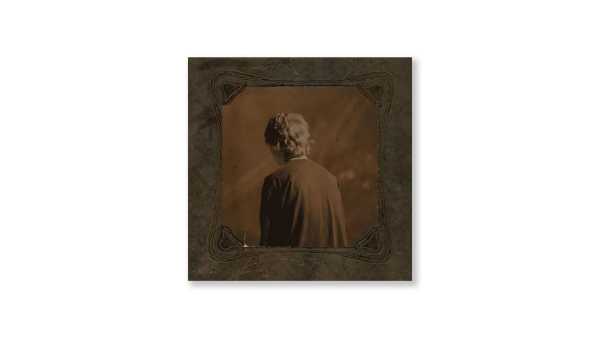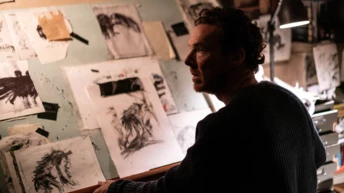
Save this storySave this storySave this storySave this story
Midway through the music video for “American Teenager,” a feel-good pop song that has been streamed more than a hundred million times, the camera cuts, for an instant, to two children sitting in front of a television, watching live footage of the Twin Towers falling. The track itself, which the twenty-seven-year-old musician Hayden Anhedönia has performed at Coachella and in dozens of arenas around the world, conceals a similar darkness; fluttering harmonies and a dancey drumbeat sweeten a sure-handed critique of U.S. military agitprop. “The neighbor’s brother came home in a box / But he wanted to go, so maybe it was his fault,” Anhedönia sings. “Another red heart taken by the American dream.” Barack Obama added it to his annual favorites playlist in 2022. Anhedönia, however, had little interest in being the country’s next down-home sweetheart. “I don’t want to be a celebrity,” she told the Times, that same year.
Attention found her anyway. During the pandemic, prairie aesthetics—gingham dresses, dried wildflowers, fishtail braids—took hold among young people online: a trend quaintly named cottagecore. Anhedönia’s promotional art featured tattered American flags, wood panelling, white lace, and church spires; her Southern-gothic alter ego, Ethel Cain, became the movement’s unlikely face. But, in contrast to some adherents who seemed to be channelling nostalgia for a bygone era, her relationship to the style was complicated—part satire, part reckoning with her evangelical upbringing.
Anhedönia’s début LP, “Preacher’s Daughter,” from 2022, is a thirteen-track concept album about the abduction of the teen-age Ethel—a roots-rock opera for fans of Flannery O’Connor. The tale begins in 1991, after Ethel’s sadistic father dies and her boyfriend, Willoughby, leaves her. She runs away from home and hitches a ride with an older man who sells her into prostitution, eventually killing and cannibalizing her. The songs, which combine a languid, Lana Del Rey-esque pastiche of Southern femininity with the droning atmospherics of nineties slowcore, slyly transmit Anhedönia’s ideologies. The record’s riveting narrative and political conscience stood out in an age of generic radio fare and overcautious stars. It was a runaway hit.
This week, Anhedönia released “Willoughby Tucker, I’ll Always Love You,” a kind of prequel to her début. She writes, produces, and engineers almost all of her music; on the new album, she contributes percussion, banjo, synth, piano, bass, and at least three different kinds of guitar. This time, the story hinges on the heartbreak that put Ethel on the road to her gruesome fate. Willoughby’s father, a traumatized Vietnam vet, abuses him—on one track, Ethel calls her boyfriend a “natural blood-stained blond”—and the young lovers fantasize about escape. But the imagined happy ending is fleeting. Anhedönia soon lays out their doomed futures: Willoughby will be deployed to fight in a war, and Ethel, of course, will be kidnapped.
Not all of these details are divulged in the lyrics. Much of Anhedönia’s world-building is communicated through extratextual materials: blog posts, illustrations, Q. & A.s, and passages from a novel she has been working on, which her fans have studiously collated. The fictional universe of these records also rhymes with the circumstances of Anhedönia’s youth. Her father, like Ethel’s, was a clergyman; she, too, was raised in a small, conservative town, with loved ones who served in the military. Anhedönia’s earliest exposure to contemporary culture came in the form of the true-crime serials her grandmother loved, which kindled her own interest in the macabre. Much of her artistic education happened in church, where she sang in the choir and practiced classical piano. Her coming-out was met with predictable hostility. At eighteen, she left her parents’ house, and began making music—namely Gregorian chants and nightmarish electronic pieces, produced on GarageBand and inspired by the goth clubs where she’d been experimenting with narcotics.
Anhedönia has defied the tenets of mainstream pop stardom ever since, both in her musical output and in her outspoken politics. Following the murder of the UnitedHealthcare executive Brian Thompson, she shared a story on Instagram captioned “#KillMoreCEOs”; Fox News denounced the statement as incitement to terrorism. Last February, after Israel killed more than a hundred Palestinians in a series of air strikes on Rafah, Anhedönia posted that “the United States government is complicit in a genocide” and released a song called “من النهر”—Arabic for “from the river.” Such gestures have only endeared her to her hard-core leftist fan base. A few months ago, when “Preacher’s Daughter” was belatedly released on vinyl, it débuted at No. 10 on the Billboard Hot 200—the first such achievement for a transgender artist.
But she doesn’t seem to be in a hurry to break into the charts again. In January, she released “Perverts,” an hour-and-a-half-long noise project which includes such doom-metal nocturnes as “Onanist” and “Housofpsychoticwomn.” (Writhing with distortion, “Blair Witch Project”-style Foley, and breathy ululations, the tracks are actually among my favorites of hers.) “Cult Star Sets Out to Lose Friends and Alienate People,” a Guardian headline read. Anhedönia shared a screenshot of the review on Instagram, with obvious amusement.
“Willoughby Tucker, I’ll Always Love You” isn’t an easy listen, either. It lacks the dynamic range of Anhedönia’s début; its ten tracks, nearly half of which are strictly instrumental, often blur together. The pacing is slow, the instrumentation often impenetrable, and the characters circle endlessly around the same thoughts. (On one anaphoric bridge, Ethel moans twelve consecutive times that she can’t wait for her own death.) If, in her earlier songwriting, Anhedönia disguised her polemicizing in upbeat pop, here she submerges it via a form of hypnotism. Anhedönia has described worship music as brainwashing; given “Willoughby Tucker” ’s repetitions and melodrama, she seems to have borrowed its tactics.
Still, the voice of Ethel, who has yet to be ground down by the traumas that eventually turn her into a symbol of female victimhood, has never been clearer. On “Fuck Me Eyes,” an eighties synth-heavy single, she describes another girl from her high school, alternately slut-shaming her—“She really gets around town in her old Cadillac / In her mom’s jeans that she cut to really show off her ass”—and sympathizing with her. The tone is a little cruel and a little admiring, a nuanced sketch of the teen-age mind and its contradictions.
And later, “Nettles,” a woozy country elegy for Willoughby, who is preparing for deployment, recalls the harsh truths of “American Teenager”:
That picture on the wall you’re scared of looks just like you
I want to bleed, I want to hurt the way that boys do
Maybe you’re right and we should stop watching the news.
Even as it lulls, the album immerses. “Nettles” presages “Radio Towers,” on which we hear the insistent beeping of what can reasonably be assumed to be Willoughby’s heart-rate monitor. For five uninterrupted minutes, the track sustains and modulates the same chord over and over again, conveying the agony of waiting for a loved one’s prognosis.
Anhedönia’s staunch refusal of the spotlight may take her into richer and stranger terrain. The release of “Willoughby Tucker” concludes her record deal with Dr. Luke’s Prescription Songs, which has worked with such artists as Dua Lipa and Miley Cyrus; for her next album, Anhedönia plans to go independent. Overwhelmed by impatient and entitled fans and by the histrionics of right-wing media, she’s also deleted her social-media accounts. “I’m looking forward to being fully in control of my everything,” she said last week, on a podcast. “I want to leave behind a long legacy of art that was genuine and heartfelt—not for anybody else.” ♦
Sourse: newyorker.com







